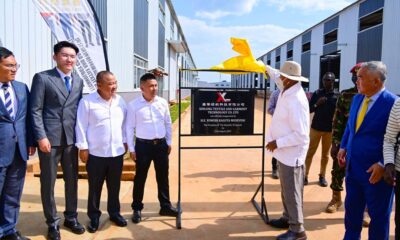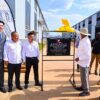Business
From Mandela’s Phone Call to 22 Million Customers: Museveni Charts MTN’s Growth Alongside Uganda’s Economic Transformation
President Yoweri Kaguta Museveni’s recent meeting with a delegation from MTN Group at State House, Entebbe, went beyond a simple courtesy call. It became a platform for reflecting on Uganda’s economic journey, MTN’s pivotal role within it, and the potential for deepened regional collaboration.1
The President’s reminiscence of a phone call from Nelson Mandela, marking MTN’s early days in Uganda, served as a powerful starting point. “I am glad that MTN has grown,” he remarked, emphasising the company’s significant expansion alongside Uganda’s evolving telecommunications landscape. This anecdote, however, was not merely a nostalgic moment; it underscored the long-term relationship between the multinational giant and the Ugandan government.
Museveni’s address focused on the crucial link between economic development and the growth of the telecommunications sector. He stressed that increased job creation and income generation directly translate into higher demand for communication services. “If people have jobs and incomes, they will buy more phones and use them more,” he stated, outlining his vision for a thriving economy driven by investments in key sectors like agriculture, manufacturing, services, and ICT.2
The President’s analysis of Uganda’s economic transformation was particularly insightful. He highlighted the challenge of transitioning citizens from subsistence farming to a money economy, a shift that has been a central focus of his administration.3 “By 1962, only 4% of Ugandans were in the money economy,” he revealed, contrasting this with the current 64%. This data-driven approach showcased the progress made while acknowledging the persistent challenges.
Beyond national development, Museveni advocated for strengthened cross-border investment, urging MTN to explore opportunities for enhanced intra-African trade.4 “You should discuss and see how you can intensify cross-border investment,” he advised, promoting regional integration as a catalyst for economic growth.
His reflections on property fragmentation and the need for innovative asset management, drawing parallels with capitalist models, showcased a forward-thinking approach to wealth creation.5 He also offered a historical perspective, contrasting Uganda’s development trajectory with South Africa’s, attributing the differences to varying climatic and socio-economic conditions.6
MTN Group Chairman, Mr. Jonas Mcebisi, responded with assurances of the company’s long-term commitment to Uganda.7 “MTN is not here for the short term, we are here for the long haul,” he affirmed, expressing gratitude for the government’s support and highlighting the company’s impressive growth, with 22 million customers in Uganda and nearly 300 million globally.8
Mcebisi’s interest in facilitating Ugandan businesses’ entry into the South African market signalled a desire for deeper economic ties between the two nations.9 The meeting, attended by key government officials, illustrated the collaborative spirit driving Uganda’s economic development, with MTN playing a significant role in its unfolding narrative.10 This narrative, woven from historical reflections and forward-looking strategies, paints a picture of a nation leveraging technology and investment to achieve sustainable economic growth.
Comments






























